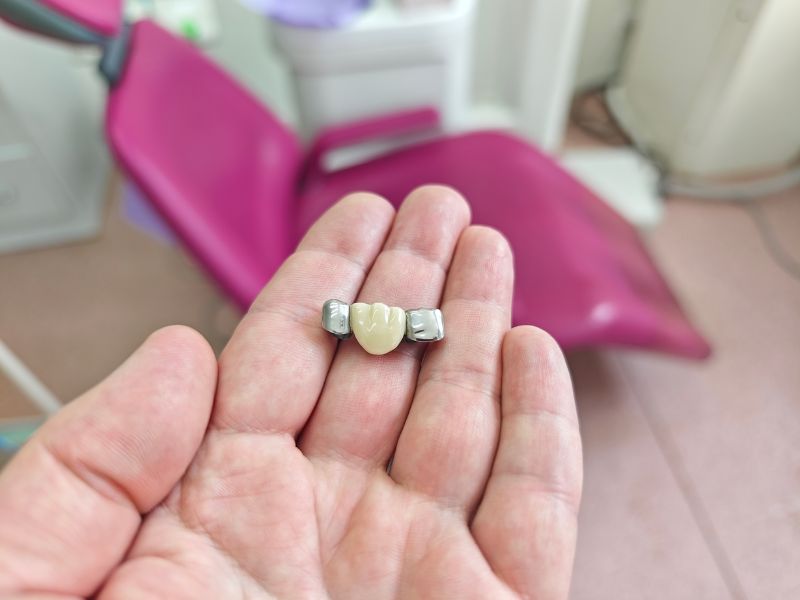
When it comes to restoring a damaged tooth, dental crowns are one of the most effective solutions in cosmetic dentistry. Whether you need to protect a weakened tooth, improve aesthetics, or cover a teeth dental implant, choosing the right crown material is essential for durability, function, and appearance. With multiple materials available—such as porcelain, zirconia, metal, and composite, it’s important to understand their differences. This guide will help you determine which crown material is best suited for your dental needs.
Understanding Dental Crowns and Their Purpose
A dental crown is a custom-made cap placed over a damaged or weakened tooth to restore its shape, strength, and function. Crowns can also be used to cover dental implants, offering a natural-looking and long-lasting replacement for missing teeth. Crowns are commonly recommended for:
- Strengthening a tooth after a root canal
- Protecting a cracked or severely worn tooth
- Covering a discolored or misshapen tooth for cosmetic dentistry purposes
- Serving as the visible part of a teeth dental implant
With the right crown material, patients can enjoy a strong, functional, and aesthetically pleasing restoration.
Types of Crown Materials
Each crown material has its advantages and considerations, depending on where the crown is placed, durability needs, and cosmetic preferences. Let’s take a closer look at the most common options.
Porcelain Crowns (All-Ceramic Crowns)
Are a popular choice for front teeth due to their natural, tooth-like appearance. These crowns mimic the translucency of real teeth and are stain-resistant, making them ideal for cosmetic dentistry in North Vancouver. Since porcelain crowns do not contain metal, they are biocompatible and a great option for patients with metal allergies. However, they are not as strong as metal or zirconia crowns, which means they may not be ideal for back teeth where strong biting force is required.
Zirconia Crowns
Offer a balance between durability and aesthetics. These crowns are extremely strong, resistant to wear, and can be color-matched to blend seamlessly with natural teeth. Zirconia is often preferred for back molars due to its strength, making it an excellent option for patients who require a long-lasting restoration. However, zirconia crowns are more opaque than porcelain, which can make them look slightly less natural. If not polished properly, they can also cause wear on opposing teeth over time.
Metal Crowns (Gold or Base Metal Alloys)
Are the most durable option, often used for back molars that endure heavy chewing forces. They require less removal of the natural tooth structure, making them a conservative choice for restorations. Metal crowns are resistant to chipping or breaking, which contributes to their long lifespan. However, their metallic color makes them less desirable for visible teeth, and some patients may experience allergic reactions to metal alloys.
Porcelain-Fused-to-Metal (PFM) Crowns
Combine the strength of a metal base with the natural appearance of a porcelain exterior. This makes them a good choice for patients who want both durability and a tooth-colored restoration. While PFM crowns are more affordable than all-porcelain or zirconia crowns, the metal layer may become visible over time, leading to a dark line near the gums. Additionally, they may cause more wear on opposing teeth compared to other crown materials.
Composite Resin Crowns
Are a budget-friendly option typically used as temporary restorations. These crowns can be color-matched to teeth and provide a natural appearance. However, they are not as durable as porcelain, zirconia, or metal crowns and are more prone to staining and wear. Due to their shorter lifespan, composite crowns are often recommended for patients who need a temporary solution before receiving a permanent crown.
How to Choose the Right Crown Material for You
The best crown material depends on several factors, including where the crown will be placed, your aesthetic preferences, durability requirements, and budget. Porcelain crowns are ideal for front teeth due to their lifelike appearance, while zirconia or metal crowns provide strength for molars that endure heavy chewing. PFM crowns offer a good balance of durability and aesthetics but may develop a visible metal edge over time. Composite crowns can serve as a temporary solution for those on a budget or waiting for a permanent restoration.
For patients receiving teeth dental implants, selecting the right crown material is just as important as choosing the implant itself. Since dental implants are designed to last a lifetime, the crown placed on top should be strong, durable, and aesthetically pleasing. Zirconia and porcelain crowns are the most commonly used for dental implants, offering both strength and a natural appearance. Your dentist will assess your bite, lifestyle, and cosmetic goals to recommend the ideal crown material.
Why Choose North Shore Smile for Your Dental Crown?
At North Shore Smile, we specialize in high-quality dental crowns tailored to meet the needs of our patients. Whether you’re looking for a cosmetic dentistry solution to enhance your smile or a durable crown for teeth dental implants, our team is here to help. We use the latest materials and technology to ensure your restoration not only functions optimally but also blends beautifully with your natural teeth. Our commitment to personalized care means that we will guide you through the decision-making process, ensuring you choose a crown material that best suits your lifestyle and long-term dental health.
Contact us today to help you choose the best dental crown for your life style and restore your perfect smile.
